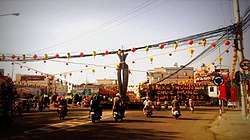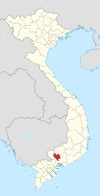Lái Thiêu
You can help expand this article with text translated from the corresponding article in Vietnamese. (March 2015) Click [show] for important translation instructions.
|
Lái Thiêu
Phường Lái Thiêu Tân Thới | |
|---|---|
 Vietnamese New Year celebration in 2012 at Lái Thiêu's People Committe roundabout | |
 Location of Lái Thiêu in Bình Dương Province | |
 | |
| Coordinates: 10°54′17.6″N 106°42′0.0″E / 10.904889°N 106.700000°E | |
| Country | |
| Region | Southeast |
| Province | Bình Dương |
| City | Thuận An |
| Founded | January 13, 2011 |
| Area | |
| • Total | 3.05 sq mi (7.89 km2) |
| Population (2021)[2] | |
| • Total | 54,394[1] |
| • Density | 17,860/sq mi (6,895/km2) |
| Time zone | UTC+7 (Indochina Time) |
| Postal code | 75206 |
| Area code | 274 |
Lái Thiêu is a ward of Thuận An city in Bình Dương Province of Southeast region of Vietnam. It is famous for its ceramics and fruits.[3][4]
The area of Lái Thiêu nowadays was known as Tân Thới before 1975, it has been one of the two downtown of former Lái Thiêu district (along with An Thạnh, also known as Búng) and the county seat here since Minh Mạng dynasty.
After 1975, Lái Thiêu district renamed to Thuận An district, the name Lái Thiêu was renamed for Tân Thới commune as Lái Thiêu commune then Lái Thiêu town. Until 2011, when Thuận An district was upgraded to District-level town, Lái Thiêu town became Lái Thiêu ward.
Administrative divisions
[edit]Lái Thiêu consists of 9 neighborhoods:
- Hòa Long
- Long Thới
- Chợ
- Nguyễn Trãi
- Đông Nhì
- Đông Tư
- Bình Hòa
- Bình Đức 1
- Bình Đức 2
Education
[edit]- Nguyen Trai High School
- Nguyen Van Tiet Middle School
- Phu Long Middle School
- Tran Quoc Toan Primary School
History
[edit]Before 1975, Lái Thiêu used to be a rich land with many features such as tourism to Ngang Bridge (Cầu Ngang) and Bình Nhâm fruit gardens, traditional craft villages, lacquer crafts, glass paintings, clogs, crockery, porcelain, etc. Lái Thiêu area is now Thuận An area with 11 communes of Tân Thới (Lái Thiêu ward nowadays), Phú Long, Vĩnh Phú, Bình Nhâm, Bình Hòa, Hưng Định, An Thạnh (Búng), An Sơn, Bình Chuẩn, Thuận Giao and An Phú. After 1975, Thuận Giao and An Phú areas were planned to be built in the direction of an industrial park where many people from other places come to live and work, so the name Thuận An is a combination of Thuận Giao and An Phú to replace Lái Thiêu.
After that, Lái Thiêu was named for the downtown of Thuận An district (formerly known as Tân Thới) and now is the central ward of the city of Thuận An.
Gallery
[edit]-
Nguyễn Trãi Street in Lái Thiêu ward
-
Thuận An City People's Committee Roundabout
-
The historic Phú Long iron bridge used for trains on Saigon – Lái Thiêu – Lộc Ninh railway, now is no longer use and was demolished.
References
[edit]- ^
Công văn số 157/TB-SYT: Đánh giá cấp độ dịch Covid-19 trên địa bàn tỉnh Bình Dương (tính đến 18g00’ ngày 03 tháng 11 năm 2021). "Dân số đến 03 tháng 11 năm 2021 - tỉnh Bình Dương" (PDF).
{{cite web}}: CS1 maint: numeric names: authors list (link) - ^ a b "Cổng Thông tin điện tử Chính phủ".
- ^ Khánh Chương Trà̂n Gó̂m Việt Nam - 2001 Page 165 "In the late 1950s, a similar kind of pottery was manufactured at Lái Thiêu but with a graver tone of enamel named ... In terms of ornamental style, Lái Thiêu pottery is not much different from Bien Hôa ceramics but it has its own beauty, grave ..."
- ^ Vietnam Fine Arts Museum - Page 104 Bảo tàng mỹ thuật Việt Nam - 2000 "Another sort of Ceramics was produced by Phủ Lãng, Quế Quyển ovens (northern Vietnam), Bảo Vinh (central Vietnam), Lái Thiêu ( southern Vietnam). They might have come into being very early and were rather well developed in this ...




